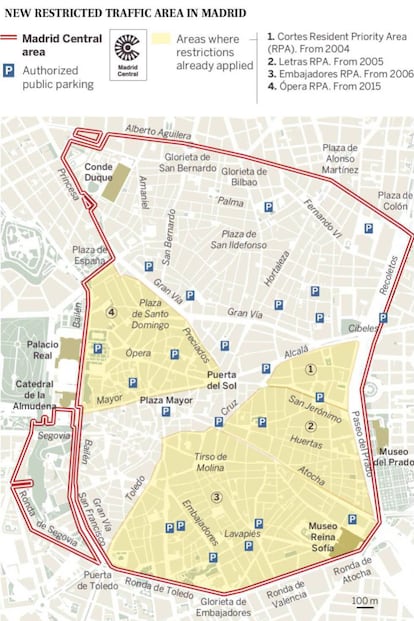Madrid to ease low-emissions zone restrictions: More cars, lower parking fees
The mayor’s new plan, which will come into effect next year, will allow vehicles currently banned to access the center of the capital

Madrid City Hall has announced it will ease traffic restrictions in the Madrid Central low-emissions zone as part of a reworked plan called Madrid 360. The new initiative, which will come into effect in 2020, will allow cars currently banned from the city center to enter the low-emissions zone, see parking fees reduced and give more parking space to motorcycles.
Madrid Central was introduced by the former leftist administration of Mayor Manuela Carmena at the end of 2018. The pioneering initiative made 472 hectares of the city center off-limits to traffic, except for local residents and public transportation. Air pollution in the city center fell to “historic lows” in June, after fines began to be issued for vehicles that violated the low-emissions zone, according to the environmental group Ecologists in Action.
In 2022, the traffic restrictions will be extended to the entire area within the M-30 ring road
But Madrid Central was heavily opposed by the conservative Popular Party (PP) and center-right Ciudadanos (Citizens), which campaigned against the plan in the lead up to the May 20 local elections. When the two parties formed a local coalition government in June, thanks to the votes of the far-right party Vox, the new mayor of Madrid, José Luis Martínez-Almeida of the PP, announced that fines for violating drivers would be suspended – a decision that was soon overturned by the courts.
Almeida today presented Madrid 360, which he says aims to “reconcile air quality with social progress.” Under the plan, vehicles carrying two or more people that have a C environmental sticker (modern diesel and gasoline cars) – which are currently banned from Madrid Central – will be allowed to enter the low-emissions zone. Business owners will be able to drive into Madrid Central with the same permissions as residents. The number of parking spaces for motorbikes will nearly double to 21,000, and motorcyclists will be able to enter the city center during a wider time frame.
The cost of parking will also be cut: electric cars will be able to park for free, ECO (hybrid vehicles) will pay half price, and cars with C stickers will receive a 10% discount. The number of parking spots for non-residents will also be increased.

The initiative plans to gradually ban the most-polluting vehicles from the city center, with cars without an environmental sticker to be prohibited from entering the low-emissions zone from 2021.
In 2022, the traffic restrictions will be extended to the entire area within the M-30 ring road, and in 2023 to the ring road itself, with the exception of residents. In 2024, the rules will be extended across the municipality and in 2025, residents will also be subject to the traffic restrictions. In other words, no car without an environmental sticker will be able to drive through the city.
Other measures
According to Almeida, the local government “is aiming to absorb three times as many emissions as Madrid Central.” To achieve this goal, Madrid City Hall plans to substitute gas and coal-fired burners, introduce new tactics to manage polluting gases, as well as two free zero-emission bus lines: between the Metro stations San Bernardo and Puerta de Toledo, and between Moncloa and Felipe II.
But Almeida warned that Madrid 360 also plans to “reorder cycling itineraries and get rid of bicycle lanes that hinder traffic.”
The new plan has come under attack by Ecologists in Action, which says it is “dangerous” to allow C-sticker vehicles to enter the low-emissions zone. “These cars represent 36% of circulating traffic, meaning this measure is clearly negative and going to increase traffic a lot instead of reducing it,” said Paco Segura, the spokesperson for Ecologists in Action.
English version by Melissa Kitson.
Tu suscripción se está usando en otro dispositivo
¿Quieres añadir otro usuario a tu suscripción?
Si continúas leyendo en este dispositivo, no se podrá leer en el otro.
FlechaTu suscripción se está usando en otro dispositivo y solo puedes acceder a EL PAÍS desde un dispositivo a la vez.
Si quieres compartir tu cuenta, cambia tu suscripción a la modalidad Premium, así podrás añadir otro usuario. Cada uno accederá con su propia cuenta de email, lo que os permitirá personalizar vuestra experiencia en EL PAÍS.
¿Tienes una suscripción de empresa? Accede aquí para contratar más cuentas.
En el caso de no saber quién está usando tu cuenta, te recomendamos cambiar tu contraseña aquí.
Si decides continuar compartiendo tu cuenta, este mensaje se mostrará en tu dispositivo y en el de la otra persona que está usando tu cuenta de forma indefinida, afectando a tu experiencia de lectura. Puedes consultar aquí los términos y condiciones de la suscripción digital.








































